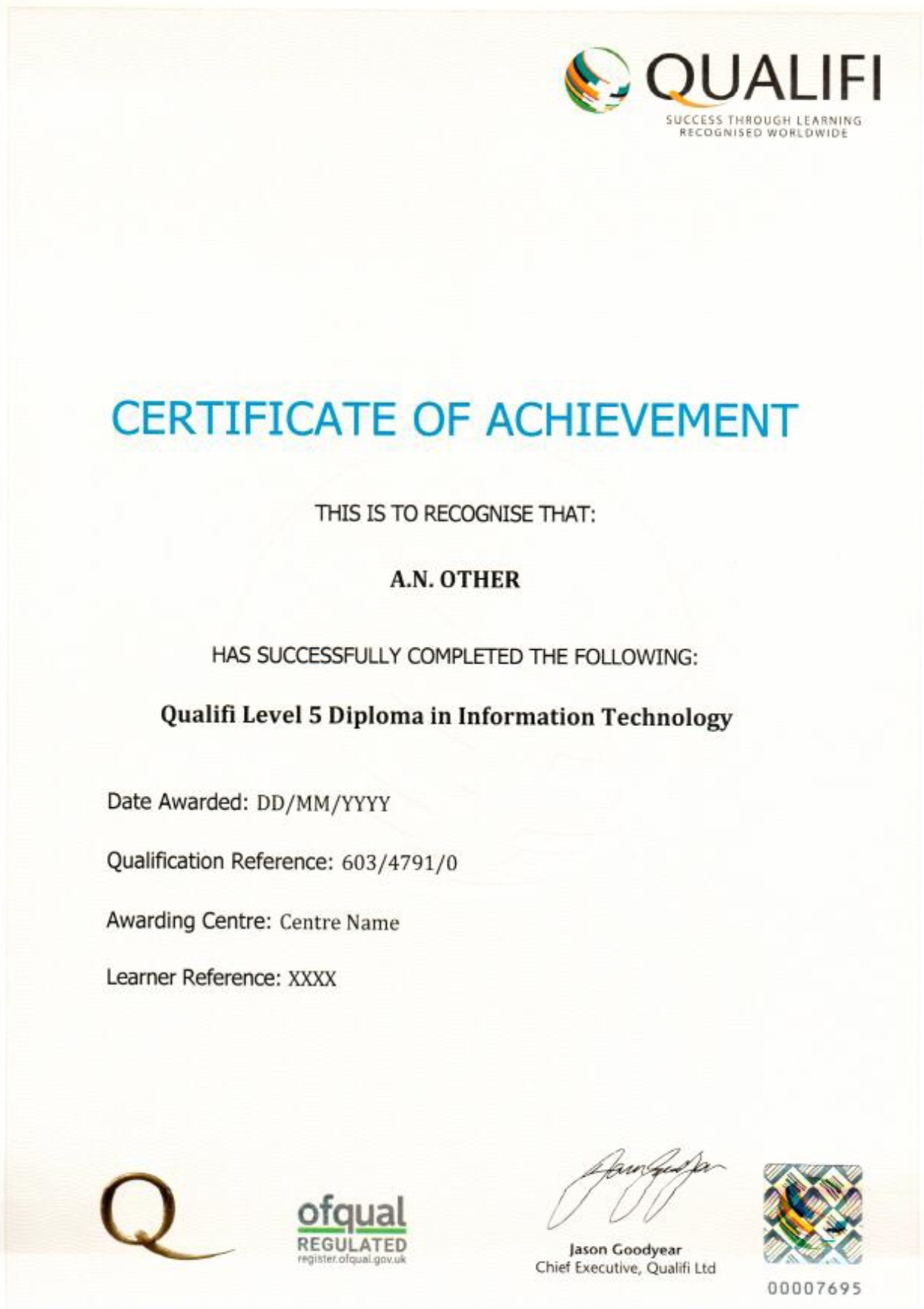Undergraduate -Level 5 Extended Diploma in Cyber Security
£2900 per level or £5500 for two levels together
This course includes student membership to BCS, The Chartered Institute For IT
About This Course
The rationale of the diploma is to provide a career path for learners who wish to develop their core capabilities within the cyber security and risk management sectors. The outcome of the Diploma, which is a recognised UK qualification, is for learners to develop the cyber security skills required by organisations globally. It is also to provide a pathway via learner credits and potential direct entry into related Level 6 Cyber Security and/or Risk Management Degree programmes.
• Examines technical cyber security measures and management, project management, and leadership skills for business responses to major incidents.
• Provides solid business management and leadership education, including disaster management, project management, and business continuity management.
• Designed and delivered by a mix of academics from business schools and security management teaching roles.
• Suitable for existing or aspiring organizational executives and leaders responsible for business resilience, information security, safe technological innovation, change management, HR planning, and physical risk management.
• Flexible, online, and easily blended.
• uses case studies from business and public-sector organizations.
• Suitable for those already in work or seeking to develop a structured management competency in information security, risk management, and organizational resilience.
Learning Outcomes:
- • Develops knowledge, understanding, and skills for success in cyber-security-related employment.
• Enables progression into Level 5 learning within Cyber Security domains.
• Provides specialist study relevant to individual vocations and environments.
• Enhances learners’ ability to contribute positively to business technology and risk management environments.
• Develops skills and personal qualities essential for successful working life.
• Enables progression into a university-approved Level 6 degree award.
• Develops learners’ ability to contribute positively to ethical practice in technology and risk management environments.
Examples of University Progression
- Middlesex University
- University of Gloucestershire
- Southampton Solent University
- University of Derby
- And More UK Universities & Globally.


Awarding Body

Qualification
Qualification Numbers:
Level 4 Diploma in Cyber Security (603/3331/5): 391
Qualification Number 2: Level 5 Diploma in Cyber Security (603/4139/7): 392



Course Details
The fee for enrolling in the level 4 and level 5 courses together is £5600. Alternatively, students can enrol in a single level (level 4 or 5) for £2900 each.
Students can make payment using one of the following methods:
- Credit or debit card
- Bank transfer
- Interest free monthly instalments
- Paypal
- Western Union
- ELCAS funding
All course material, including online modules and written assignments
Personal tutor support with 1-2-1 Zoom sessions
Dedicated student support
Access to an online social learning forum
Assignment marking and feedback
FREE TOTUM student discount card
FREE laptop*
FREE access to Our Hubs
*excluding ELCAS funded learners
If you decide to top up to a full undergraduate degree through an accredited UK university, the costs are as follows.
Middlesex University
BSc (Hons) Information Technology and Business Information Systems (Top-up) – ON CAMPUS– £9,250 (UK)/ £14,700 (INT/EU)
University of Gloucestershire
BSc (Hons) Computing – £3,250
University of Derby
BSc (Hons) Computing and Information Technology– £5,250
Southampton Solent University
BSc (Hons) Information Technology for Business, fee £9,250
University of Huddersfield
BSc (Hons) Information Technology (Top-up)– ON CAMPUS– £9,250
NOTE: UK/EU students may be eligible for student loans for the top-up portion of their studies. Visit www.slc.co.uk for more information.
To enrol onto the level 4 course, you must be at least 18 and have a full secondary education. Before enrolling onto the level 5 course, you must have attained a level 4 or equivalent.
Mandatory Unit
- Cyber Security Threat and Risk
- Network Security and Data Communications
- Database Security and Computer Programming
- Incident Response, Investigations and Forensics
- Security Strategy: Laws, Policies and Implementation
- Cyber Security Threats and Risk: Banking and Finance
- Cyber Wars
- Cryptography
- Digital Investigations and Forensics
- Communications and Incident Management
- Strategic Leadership
CSEC01: Cyber Security Threat and Risk
Cyber security breaches cause significant personal and organisational damage and pose a clear and
present risk to business profitability and resilience. Forbes, the business magazine, estimates that
The annual cost of cybercrime might reach (or surpass) $2 trillion by 2019. At a ground-level, Cyber
security breaches are causing business insolvencies and posing challenges to employee safety and
wellbeing.
In this unit, the learner will be introduced to a variety of threats and risks emanating from the
cyberspace. The unit will look at various methods of attack and will use case studies to analyse
various threat vectors, including Malware, Botnets and Trojans
Network Security and Data Communications
In this unit, the learner will look at the component parts of digital communications and
interoperability with IT networks, hardware, firmware and software components. The inherent
insecurity of the internet will be described and discussed. What are the basics of computer science?
and technology? How do computers communicate with each other? How can networks
communicate and how can we plan their security architecture in a more proactive and organised
manner?
Database Security and Computer
Programming
Database security concerns the use of a broad range of information security controls to protect
databases (potentially including the data, the database applications or stored functions, the
database systems, the database servers and the associated network links) against compromises of
their confidentiality, integrity and availability..
Incident Response, Investigations and
Forensics
In this unit, the learner will examine Incident response and Emergency Response Teams
(CERTS), and events requiring investigative techniques. Learners will identify and examine aligned
business tasks and task forces, including Disaster Recovery, Business Continuity Management and
Crisis Management.
Security Strategy: Laws, Policies and Implementations
Knowing how to build a cyber defence strategy, what legal tools require consideration, and how policies
can be written and embedded, are all vital ingredients to successful in-house cyber security
practices. In this unit, the learner will bring together knowledge acquired from previous units and build on it
in relation to developing plausible strategic plans, executive buy-in and legal compliance. Key
questions and challenges are posed:
Optional:
Cyber Security Threats and Risks: Banking & Finance:
In this unit, the learner will look at banking and financial services in relation to cyber security threats
and risks and the potential methods to mitigate and lessen organisational vulnerability to cyber
security attacks.
Cyber Wars:
In this unit the learner will look at the emerging cyber offensive and defensive strategies of nation
states that reportedly engage in what is called ‘cyber war’ or ‘information warfare’.
What nation-state governments have the most advanced cyber capabilities? How might they be
used to defend or attack an institution, group or infrastructure? Why is this knowledge important for
cyber security practitioners based within businesses?
Undergraduate Level 5 Diploma in Cyber Security:
Mandatory Units:
Cryptography
Understanding Cryptography in Computer Security
• Cryptography is the process of encrypting and decrypting information to protect confidentiality, integrity, and authenticity.
• Policies, guidelines, and laws have shaped information security and organizational resilience.
• This unit introduces learners to cryptography, its history, and its subdisciplines.
• It explores methods of attack, including side-channel, additional encryption, and escrow principles and keys.
Digital Investigations and Forensic
This unit describes and explains how to conduct investigations with cyber-enabled equipment.
including on public-internet-facing networks or other network environments. Much evidence is lost
or ruled inadmissible within courts and tribunal environments because it has been mishandled and
corrupted (or could have been) by investigators or those with a perceived chain of custody over the
data. Moreover, in a planet of several billion cyber-enabled devices, there are few qualified cyber
investigators, it is now the case that many organisations have to manage part or all of a cyber
incident investigation, because the national CERT or police/security agencies are otherwise
prioritised.
Communications and Incident Management
The professional and lawful response to managing an incident can be the difference between
company survival or otherwise. Poor responses to major incidents, including mega data breaches,
have significantly damaged organisational reputations and financial performance. Significantly
Mismanaging a cyber incident can result in catastrophic personal and organisational consequences.
Such business ‘impacts’ are covered in depth within our Threat and Risk units at Levels 2, 3, and 4.
and will be explored during this Level 5 unit as part of the contextual case-study learning. and
isomorphic reflections that are central to this unit.
Strategic Digital Leadership
In order for an organisation to be more cyber-secure, leadership across employees and stakeholders is required. The C-Suite is responsible for delivering networks. However, what happens if the C-Suite either doesn’t pay attention to or doesn’t comprehend the Tier One threat that information security poses? In this unit, learners will develop an understanding of the key features of tech leadership and performance management. Learners will evaluate strategic leadership and management approaches within a tech sector setting, and what it means to be a ‘senior level influencer’.
The Undergraduate Level 5 Extended Diploma is the combination of both Level 4 and Level 5 Cyber Security courses and is made up of 6 written assignments at each level. The assignments are approximately 2,000-3,000 words each. Students are provided support on the modules and assignments via the ‘Tutor’ section of the learning platform.
The assignment unit titles for the level 4 course are:
- Cyber Security Threat and Risk
- Network Security and Data Communications
- Database Security and Computer Programming
- Incident Response, Investigations and Forensics
- Security Strategy: Laws, Policies and Implementation
- Cyber Security Threats and Risk: Banking and Finance
- Cyber Wars
More information about the level 4 units can be found here https://qualifi.net/qualifi-level-5-extended-diploma-in-cyber-security/
The assignment unit titles for the level 5 course are:
- Cryptography
- Digital Investigations and Forensics
- Communications and Incident Management
- Strategic Leadership
More information about the level 4 units can be found here: https://qualifi.net/qualifi-level-5-extended-diploma-in-cyber-security/
Whilst studying this course, students will develop their skills in programming, systems analysis and design, software development. Upon successful completion of the course, students can pursue a career in Cyber Security within the public or private sector.
Choose your course option
Undergraduate Level 5 Extended Diploma In Cyber Security
-
University 1st year (Level 4) Full course materials and assignments
-
University 2nd year (Level 5) Full course materials and assignments
-
Unlimited tutor support
-
Recognised Of qualification
Diploma In Cyber Security
(Level 5)
-
University 2nd year (Level 5) Full course materials and assignments
-
Unlimited tutor support
-
Recognised Of qualification
Diploma In Cyber Security
(Level 4)
-
University 1st year (Level 4) Full course materials and assignments
-
Unlimited tutor support
-
Recognised Of qualification
Request a Course Prospectus
Related courses

Undergraduate Diploma in Information Technology – Level 5
No. of units: DIT401 to DIT510 Qualification: Level 5 Diploma in Information Technology – 603/4791/0 Course option £2,990 / £4,900 About This Course The rationale

University Undergraduate Level 5 Diploma in Cyber Security (year 2)
No. of units: DSC01 to DSC04 Qualification: Level 5 Diploma in Cyber Security – 603/4139/7 Course option £4,500/ £6,900 / £7,500 About This Course The

Undergraduate Level 4 Diploma in Cybersecurity
No. of units: CSEC02 to CSEC07 Qualification: Level 4 Diploma in Cyber Security (603/3331/5) Course option £4,500 / £5,900 / £7,500 About This Course QUALIFI








